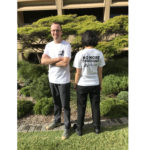The Impact of Police Strip Searches on Kids And Sexual Abuse Victims

Right now, when taxpayers’ daughters and sons go out to cultural events, there’s the very real possibility that they’ll be taken into a tent alone by two armed police officers and ordered to remove their clothes
Teenagers are being led away by these adults and asked to strip naked if they’re indicated by a drug dog. However, these canines have been repeatedly shown to positively indicate people who don’t have any illicit substances on them, anywhere from two-thirds to three-quarters of the time.
A 20-year-old woman told SMH last week that being strip searched on the way into a recent music festival caused her to reexperience being sexually assaulted in the past. And she is by no means, the only individual to have been retraumatised by this practice.
While commuters on their way home at Central Station are still being confronted by officers with dogs that aren’t there for any security threat, but are mainly looking for small amounts of cannabis. And nowadays, if a citizen is indicated, they can be asked to step behind a screen to undress.
Being told to remove their clothes by two strangers with guns doesn’t just annoy a person: it intimidates, humiliates and disempowers them. And this is an experience they can’t shake for quite some time afterwards, as their environment suddenly seems less safe than it previously was.
Unacknowledged harms
“Certainly, harms seem to be coming from it,” said Samantha Lee, head of police accountability practice at the Redfern Legal Centre. “A quiet concerning one is that it’s triggering sexual assault trauma, for those who have experienced sexual assault.”
“It’s just a completely traumatising experience even for those who haven’t experienced sexual assault or violence before,” the solicitor told Sydney Criminal Lawyers. “It really does shock anyone that has been subjected to a strip search just how humiliating the experience feels.”
Amid rising concerns about the increased use of strip searches by NSW police, the Redfern Legal Centre launched the Safe and Sound campaign last December, with the aim of reducing the number of these searches and having the laws around them tightened.
The campaign has released an open letter addressed to NSW police minister David Elliot calling for a halt to the overuse of strip searches. The growing number of legal professionals who’ve signed it includes former NSW DPP Nicholas Cowdery QC and human rights lawyer George Newhouse.
According to Ms Lee, “in the long run”, the highly derided practice of strip searching is causing much more harm in the community, “than any positive impact on what might be considered issues that police are looking into”.
Targeting youth
NSW Greens MLC David Shoebridge released figures in late December that revealed over the four year period ending in June last year, the NSW Police Force had increased its use of strip searches by 47 percent. And on average, these searches turned up no illegal items 64 percent of the time.
Authorities have repeatedly denied there’s been any policy change to account for this surge in searches. But, Shoebridge has further pointed out that the number of strip searches being carried out following a dog indication has risen from 3 percent of the time in 2003 to 11 percent last year.
Data obtained via freedom of information laws by the Redfern Legal Centre shows that over the two years 2016-17 and 2017-18, 41 percent of the 9,891 strip searches in the state involved 18 to 25 years olds, while 296 minors were forced to remove their clothes by officers as well.
Aboriginal Legal Service Western NSW deputy principal solicitor Emily Winborne said last November that she’s aware of First Nations children as young as 11 years old being strip searched. And in some cases, officers have been failing to follow correct procedures.
Unaddressed trauma
The open letter lists a number of concerns about strip searches, including their increase indicating that officers aren’t confining their use to urgent circumstances as required, their propensity to trigger trauma and that ordering minors to strip off doesn’t reflect child protection principles.
Ms Lee said that while police are concerned about safety, they “seem to be going about it the wrong way”. Strip searches are meant to scare people out of being in possession of illegal drugs, but in doing this, the police are failing to look at how harmful the practice is.
Mr Shoebridge said last month that his office is conducting a search through police standard operating manuals to see if there’s any recognition that strip searches have a traumatic impact. Although, an initial search had suggested that officers aren’t advised about these implications.
On being asked questioned by smh about police protocols around using the search with trauma victims, a NSW police spokesperson issued the response, “Members of the public with nothing to hide from police should not be concerned about police searches”.
“That was a harsh and cold response,” Ms Lee continued. But, she added that this answer doesn’t represent the NSW Police Force across the board. And she’s aware that there are concerns “within the policing community about the way these strip searches are being conducted”.
Spreading the word
As for the Safe and Sound campaign, Ms Lee said it’s going well. On Tuesday, she’d just been informed that the NSW Bar Association is signing up to the open letter. And a recent community forum held last month had been standing room only.
The solicitor believes it’s this on the ground discussion regarding the detrimental impact the invasive practice is having that will ultimately curb its overuse. She stressed that once police, the commissioners and the ministers understand that parents are upset, they’ll change their attitudes.
“Most importantly, stories are being shared out in the open and that’s really what we want,” Ms Lee concluded. “That’s at the heart of this subject: getting people to share their stories about strip searches and those stories will help push for change.”







